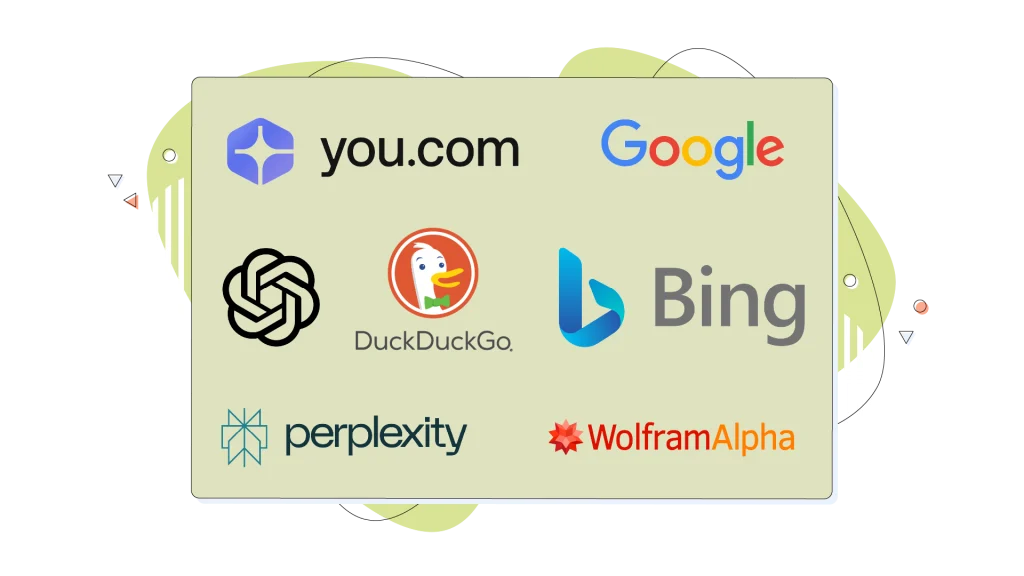Imagine a world where search engines not only answer your questions but also understand the intent behind them, delivering insights tailored specifically to your needs.
Sounds futuristic? Thanks to Artificial Intelligence (AI), this is the current reality with many search engines. AI-powered search engines are altering the way we access information, making search more intuitive, relevant, and personalized than ever before.
Traditional search engines match keywords but struggle with context. AI augments search by understanding language and user intent, delivering more valuable results.
Let’s go more in-depth into the AI trajectory in search engines and analyze some of the best tools assisting this change.
- Do All Search Engines Use AI?
- What Makes an AI Search Engine Great?
- The 7 Best AI-Powered Search Engines
- Enterprise AI Search Engines
- AI Search Engines in eCommerce
- Overview of the Best AI Search Engines
- Future Trends in AI Search Engines
Do All Search Engines Use AI?
While AI is increasingly becoming the backbone of modern search engines, not all platforms fully embrace its capabilities. Regular search engines, such as early versions of Google or Yahoo, relied heavily on basic algorithms like PageRank to rank web pages based on keywords and links. These systems lacked the ability to understand context or intent.
Today, most mainstream search engines have adopted AI to varying degrees. For example, Google employs advanced AI models like Bidirectional Encoder Representations from Transformers (BERT) and Multitask Unified Model (MUM) to interpret the complexities of language.
AI search engines work by taking advantage of Machine Learning (ML) and Natural Language Processing (NLP) to better understand user queries and deliver relevant results. It’s like magic.
Our Website Builder also works like magic to create stunning websites with an easy-to-use DIY drag-and-drop editor. With professional templates and eCommerce store support, it’s a one-product solution for many use cases, backed by our 100% Satisfaction Guarantee.
However, some privacy-focused search engines, like DuckDuckGo, only use limited AI for contextual search to avoid compromising user data. On the other hand, niche or outdated search platforms may still rely on traditional methods without AI integration.
Major search engines like Google and Bing have integrated AI capabilities to amplify the search experience and compete with newer AI search engines, illustrating a shift in the search market dynamics.

What Makes an AI Search Engine Great?
An AI search engine makes searching easier by going beyond the usual methods. Rather than just giving you a bunch of website links, it works to answer your questions directly.
It collects information from many different places and uses smart technology to put it all together into a few clear paragraphs, often mentioning where the information comes from.
When evaluating these tools, weighing the pros and cons of the AI search engine is paramount for making the best decision.
Here are the main qualities that make a good AI search engine:
- Natural language processing: The ability to understand and interpret user queries in conversational language is a hallmark of top AI search engines. NLP allows the platform to go beyond keywords, grasping context, intent, and even subtleties like synonyms or slang.
- Context awareness: Great AI search engines take into account user behaviour, search history, and preferences to provide personalized results. This context-aware approach ensures that the engine delivers answers tailored to individual needs.
- Credibility and accuracy: A great AI search engine prioritizes reliable information, sourcing data from trustworthy websites and databases. Advanced engines like Wolfram|Alpha emphasize verifiable answers, which are vital for research and professional use.
- Multimodal capabilities: The ability to process inputs beyond text—like voice commands, images, and videos—adds versatility and convenience to a search engine. For instance, visual search through platforms like Google Lens has revolutionized how users interact with search technology.
- Privacy protections: In an era of growing data privacy concerns, AI search engines that safeguard user data stand out. Platforms like DuckDuckGo gain loyalty by providing intelligent results without compromising anonymity.
- Innovative features: Features like AI-generated summaries, conversational interfaces, and seamless integration with third-party tools elevate a search engine from good to exceptional. These innovations build up usability and polish the overall search experience.

The 7 Best AI-Powered Search Engines
In today’s Earth, filled with information, AI search engines help make finding what you need easier, more personal, and more effective.
When looking at different choices, it’s noteworthy to think about which AI search engine works best for you, considering things like how it functions, its interface, and what special features it offers.
These tools use smart AI technology to not just find information but also to understand and combine data in ways that truly connect with users.
Here’s a list of some of the most impressive AI-driven search engines that are currently influencing the future of search.
- Perplexity AI
- Microsoft Bing
- Google Search AI Enhancements & AI Overviews
- ChatGPT as a Search Engine Alternative
- You.com
- Wolfram|Alpha
- DuckDuckGo
1. Perplexity AI: For Deep Knowledge Exploration
Perplexity AI is designed for users who value transparency and depth in their searches. This search engine focuses on providing detailed answers backed by credible citations. So, every little detail has a source that it links to, allowing you to quickly evaluate and cross-check the information presented.
What sets Perplexity AI apart is its ability to break down complex topics and present clear explanations while linking to their sources. This makes it a go-to choice for researchers, students, and professionals looking for consistent, in-depth information.
The emphasis on knowledge exploration and accuracy distinguishes Perplexity AI in the crowded AI search engine space.
Perplexity Pros & Cons
Pros:
- Εasy to use.
- Νo account needed for a basic search.
- 5 more in-depth searches per day for free if you create an account.
Cons:
- Lacks some features found in other more advanced AI models.
2. Microsoft Bing: An AI-Powered Search Engine
Microsoft Bing has made significant strides with AI, particularly through its integration with Microsoft Copilot into the Bing search engine.
This upgrade powers a conversational chatbot, helping users refine their queries for more precise results. Additionally, Bing’s visual search and AI-based image creation tools elevate the search experience.
Bing also shines in visual search, where users can upload images to find related content, and its AI-based image creation tools further elevate its versatility. These innovations make Bing a standout choice for users seeking dynamic, AI-driven search experiences.
Enhancing your website with high-quality visuals is critical for search engine performance. Pair these AI tools with our Managed WordPress Hosting for a seamless experience in creating and managing visually stunning websites optimized for Bing and other search engines.
Microsoft Bing Pros & Cons
Pros:
- Integrated AI chatbot for conversational search.
- Advanced visual and image creation tools.
- Regular updates incorporating state-of-the-art AI technology.
Cons:
- Results may sometimes prioritize Microsoft ecosystem content.
- Limited customization compared to more flexible engines like You.com.
3. Google Search AI Enhancements: AI Overviews
Google remains the pioneer in search innovation, consistently leveraging cutting-edge AI technologies. The Google Search Generative Experience (SGE) is an innovative approach to enhancing search results by utilizing generative AI. Google looks to be in a commanding position in 2024, compared to its competitors, as it has a desktop market share exceeding 80%.
Tools like BERT and MUM enable Google to understand natural language queries better than ever before.
BERT stands for Bidirectional Encoder Representations from Transformers. BERT learns from text that isn’t labelled by looking at the words around it, both before and after each word in every layer. Because of this, Google can take the pre-trained BERT model and easily adjust it by adding just one more layer to make it work really well for many tasks. This includes things like:
- Answering questions
- Understanding language
All that without needing to change the whole design for each specific task. Features like Google Lens bring visual search to life, while voice search integration allows users to find information hands-free.
AI Overviews is another take on AI-generated search results that was announced in 2024. It puts together a brief summary of some sources connected to your question above the usual list. However, unlike other search engines on this list, you can scroll down past the AI Overview and look at the links yourself.
On another note, Google Gemini is a different service from Google. The basic version is free to use for all, and can now search the internet (as does ChatGPT). The goal of Google Gemini is to bridge the gap between information retrieval and conversational AI, making digital interactions feel more intuitive and responsive.
Google Pros & Cons
Pros:
- Exceptional natural language processing with BERT and MUM.
- Industry-leading visual and voice search tools.
- Innovative features like AI Overviews and Google Gemini.
Cons:
- Heavy reliance on user data for personalization raises privacy concerns.
- Ads can sometimes clutter search results.
4. ChatGPT as a Search Engine Alternative
While not a traditional search engine, OpenAI’s ChatGPT functions as an impressive AI-driven alternative, especially now that it does search the web in real-time for relevant answers.
Unlike a regular search engine, which typically displays a list of links in response to user queries, ChatGPT interprets natural language queries and generates detailed responses.
Its ability to handle complex or nuanced questions makes it a powerful tool for problem-solving, research, and creative brainstorming. However, while it excels at producing conversational answers, it is best used alongside traditional search engines for comprehensive information retrieval.
Looking to launch a blog or informational website to capitalize on ChatGPT’s powerful content creation? Our WordPress Hosting is designed for bloggers and entrepreneurs, offering simplicity and power in one package.
ChatGPT Pros & Cons
Pros:
- Engaging conversational format that feels intuitive.
- Ideal for complex queries and creative problem-solving.
- Strong understanding of natural language.
Cons:
- Limited access to real-time or web-based data (unless connected to browsing tools).
- May occasionally provide inaccurate or incomplete information.
5. You.com: Customizable AI Search
You.com offers a unique approach to search by allowing users to personalize their search experiences. Users can submit follow-up questions to refine their queries and receive more contextually relevant answers, thereby enhancing user interaction. Unlike traditional engines that prioritize one-size-fits-all results, You.com integrates AI with customizable apps and plugins to cater to specific needs.
One standout feature is the ability to submit follow-up questions for refining results. This interactivity ensures users receive more contextually relevant answers, enhancing engagement and usability. With its focus on customization, You.com has built a strong suit as one of the most versatile AI-powered search engines.
You.com Pros & Cons
Pros:
- Highly customizable search experience.
- Integration of various plugins and apps.
- Supports follow-up queries for refined results.
Cons:
- You need to register in order to use it.
- Limited adoption compared to giants like Google or Bing.
- It may feel overwhelming for users who prefer simpler interfaces.
6. Wolfram|Alpha: Computational Search Excellence
Wolfram|Alpha is a powerful computational knowledge engine tailored to answering specific and complex queries. Unlike traditional search engines, it doesn’t crawl the web for pages but instead relies on curated datasets and algorithms to compute answers.
The platform is particularly popular in academia, science, and business. From solving advanced mathematical equations to generating comprehensive statistical reports, Wolfram|Alpha empowers users with actionable insights. Its focus on structured, dependable information makes it indispensable for professionals and students alike.
For businesses that rely on high uptime and top performance, our Managed WordPress Hosting provides the flexibility and power you need to use WordPress on industry-leading web servers with ultimate security.
Wolfram|Alpha Pros & Cons
Pros:
- Exceptional for solving advanced math, science, and technical queries.
- Relies on curated datasets for credible results.
- Ideal for academia, research, and professional use.
Cons:
- Limited usability for general web searches.
- Requires a premium subscription for advanced features.
7. DuckDuckGo AI: Privacy Meets Intelligence
DuckDuckGo is well-known for its commitment to privacy, and its AI-driven features boost its reputation as a secure search engine. Unlike platforms that heavily track user behaviour, DuckDuckGo integrates AI to deliver contextual results without compromising personal data in the form of a chatbot.
The search engine’s straightforward interface and intelligent capabilities allow users to obtain relevant answers without compromising their privacy. While its AI features are more limited when compared to competitors like Google or Bing, DuckDuckGo’s steadfast commitment to user security makes it a standout choice.
Stay ahead of the curve with our Website Builder, enabling you to create incredible-looking websites that cater to personalized user experiences.
DuckDuckGo Pros & Cons
Pros:
- Strong emphasis on privacy with no user tracking.
- Relevant search results with context.
- Simple, distraction-free interface.
Cons:
- Limited AI capabilities compared to advanced competitors.
- A smaller search index means fewer results for specialty queries.

Enterprise AI Search Engines
Enterprise AI search engines cater to businesses seeking to harness the power of AI for internal data management. Tools like ThoughtSpot and Elasticsearch are designed to analyze vast datasets, delivering actionable insights that drive decision-making.
For example, ThoughtSpot combines AI with natural language processing (NLP) to allow employees to query company data conversationally. Elasticsearch, on the other hand, excels in processing and indexing structured and unstructured data, making it indispensable for IT and analytics teams. These enterprise tools demonstrate how AI extends beyond consumer search to transform organizational workflows.
AI Search Engines in eCommerce
A lot of eCommerce platforms have embraced AI search engines to fortify the shopping experience. Amazon leads the way with its AI-driven product recommendations, search refinements, and voice-enabled shopping through Alexa. These features not only tweak the accuracy of search results but also anticipate user needs based on past behaviour.
Similarly, Shopify uses AI to perfect its internal search tools, helping customers find products faster and more efficiently. By understanding customer intent and preferences, AI in eCommerce search fosters higher engagement and conversion rates, proving itself to be essential for online retail success.
Overview of the Best AI Search Engines
With so many AI search engines available, choosing the right one depends on individual needs. Below is a brief comparison of some of the top platforms:
- Google Search: Best for general use, advanced natural language understanding, and visual search.
- Microsoft Bing: Excellent for integration with AI chat and image generation tools.
- Neeva AI: Ideal for ad-free, privacy-conscious users.
- You.com: Perfect for customizable searches and app integrations.
- Wolfram|Alpha: Tailored for computational queries and data analysis.
- DuckDuckGo: Focused on privacy while delivering contextual results.
Each engine has unique strengths, from privacy features to advanced analytics, making it imperative to select the one that aligns with your goals.

Future Trends in AI Search Engines
The future of AI search engines is marked by rapid innovation and integration of emerging technologies. Key trends include:
- Augmented Reality (AR) Integration: Search engines could use AR to overlay information in the real world, making searches even more immersive.
- Hyper-Personalization: AI will continue refining search results based on individual user preferences, behaviour, and context.
- Ethical AI Implementation: With increasing concerns about misinformation and bias, future search engines will likely emphasize transparent and responsible AI practices.
- Voice and Visual Dominance: Multimodal search will evolve further, prioritizing voice and visual input for seamless, on-the-go searches.
- AI-Driven Knowledge Networks: Engines will increasingly function as dynamic knowledge bases, capable of learning and adapting to new information instantaneously.
These advancements promise to revolutionize how we interact with search technology, making it smarter, more intuitive, and more aligned with human behaviour.
Conclusion
AI search engines have redefined how we explore and retrieve information in the digital age. By leveraging cutting-edge technologies, they offer personalized, structured, and intelligent search experiences that go far beyond traditional methods.
From Google’s natural language processing to DuckDuckGo’s privacy-first approach, these platforms cater to diverse needs, ensuring there’s a solution for everyone.
As AI continues to advance, the potential for search engines to become even more integrated into our daily lives is limitless. AI-powered search engines are shaping the future of how we access and understand information, whether for business, research, or personal use.
Frequently Asked Questions
What is the difference between traditional and AI search engines?
Traditional search engines rely on algorithms to match keywords, while AI search engines use machine learning to interpret context, intent, and user behaviour for more accurate results.
Do all search engines use AI?
No, not all search engines employ AI. While most modern engines like Google and Bing incorporate AI, some platforms rely on traditional methods or limit AI use to protect user privacy.
Which AI search engine prioritizes user privacy the most?
DuckDuckGo is the leading AI search engine focused on user privacy, offering contextual results without tracking or storing personal data.
How does generative AI impact search results?
Generative AI synthesizes information from multiple sources to create original, cohesive responses. While useful for complex queries, its accuracy depends on the trustworthiness of its training data.
Are AI search engines suitable for professional or academic research?
Yes, platforms like Wolfram|Alpha and Perplexity AI are designed to provide detailed, credible results, making them ideal for research and academic purposes.




